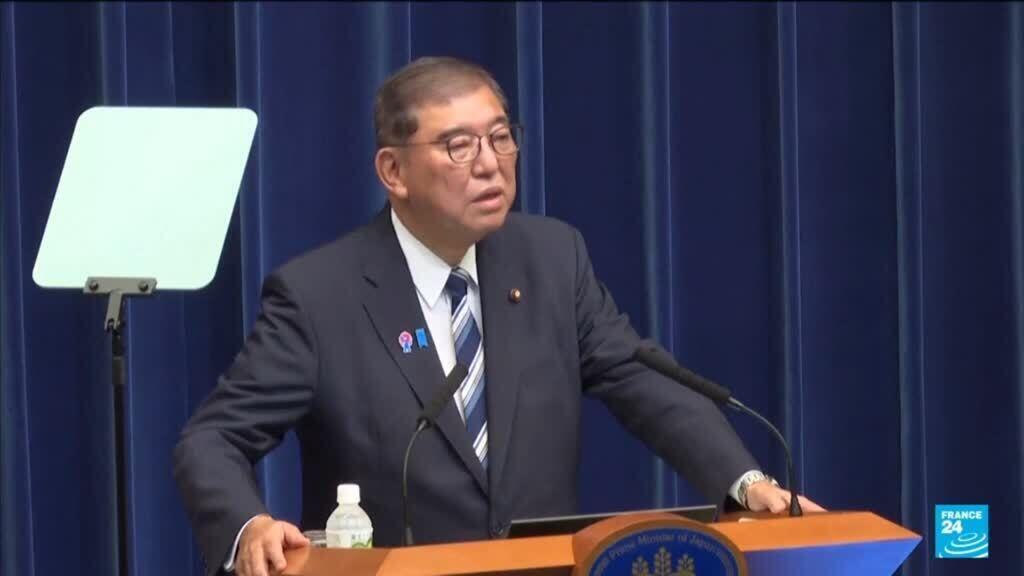Politics
Shigeru Ishiba Resigns After Historic Election Defeat in Japan

Japanese Prime Minister Shigeru Ishiba announced his resignation on Sunday, following significant pressure from within the ranks of his party. This decision comes in the wake of a historic defeat the Liberal Democratic Party (LDP) experienced in the parliamentary elections held in July 2023. Ishiba’s leadership has been under scrutiny as party members seek accountability for the loss, which marked a pivotal moment in Japan’s political landscape.
The resignation of the Prime Minister, who has held the position since September 2020, signals a shift in Japan’s political narrative. Under his leadership, the LDP faced a series of challenges, including declining public support and internal dissent. The recent election results indicated a growing discontent among the electorate, leading party members to call for a change in leadership to restore confidence and credibility.
Ishiba’s announcement has sparked discussions about the future direction of the LDP and Japan’s governance. Many party insiders believe that new leadership could reinvigorate the party’s image and approach to pressing national issues, such as economic recovery and demographic challenges. The LDP has dominated Japanese politics for decades, but the recent electoral setback has raised questions about its continued dominance.
In his resignation speech, Ishiba expressed gratitude for the support he received during his tenure. He acknowledged the party’s defeat and emphasized the need for reflection and renewal. “I take full responsibility for this outcome, and I believe it is time for fresh leadership to guide our party into the future,” he stated.
The implications of Ishiba’s resignation extend beyond the LDP. It opens the door for potential contenders within the party, who may seek to capitalize on this moment to reshape the party’s policies and strategies. Analysts are closely watching the response from party leadership and the public in the coming weeks, as the LDP prepares for a leadership election.
Japan’s political future hinges on the ability of the LDP to adapt to changing public sentiment. With calls for transparency and accountability growing louder, the party faces the challenge of regaining the trust of its constituents. As the political landscape evolves, the LDP must address the issues that contributed to its recent defeat to ensure a more robust presence in future elections.
The resignation of Shigeru Ishiba marks a significant turning point for both the Prime Minister and the LDP. As Japan navigates this transitional period, the focus will be on how the party responds to internal and external pressures and whether it can reclaim its position as a leader in Japanese politics.
-

 Business5 months ago
Business5 months agoKenvue Dismisses CEO Thibaut Mongon as Strategic Review Advances
-

 Lifestyle4 months ago
Lifestyle4 months agoHumanism Camp Engages 250 Youths in Summer Fest 2025
-

 Sports4 months ago
Sports4 months agoDe Minaur Triumphs at Washington Open After Thrilling Comeback
-

 Sports5 months ago
Sports5 months agoTupou and Daugunu Join First Nations Squad for Lions Clash
-

 Top Stories5 months ago
Top Stories5 months agoColombian Senator Miguel Uribe Shows Signs of Recovery After Attack
-

 World5 months ago
World5 months agoASEAN Gears Up for Historic Joint Meeting of Foreign and Economic Ministers
-

 Health4 months ago
Health4 months agoNew Study Challenges Assumptions About Aging and Inflammation
-

 Business5 months ago
Business5 months agoOil Prices Surge Following New EU Sanctions on Russia
-

 Entertainment4 months ago
Entertainment4 months agoDetaşe-Sabah Violin Ensemble Captivates at Gabala Music Festival
-

 Entertainment4 months ago
Entertainment4 months agoBaku Metro Extends Hours for Justin Timberlake Concert
-

 Top Stories5 months ago
Top Stories5 months agoRethinking Singapore’s F&B Regulations Amid Business Closures
-

 Business5 months ago
Business5 months agoU.S. House Approves Stablecoin Bill, Sends to Trump for Signature









